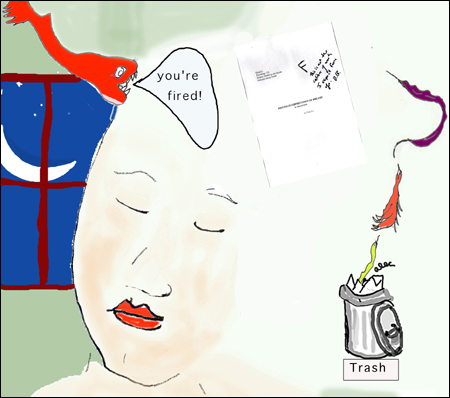Unwanted thoughts haunt the night
Findings provide first confirmation of well-known Freudian theory on dreaming

Psychologists at Harvard University and the University of Texas, San Antonio, have found that the thoughts we try to put out of mind while awake tend to reappear in dreams. The finding lends support to Sigmund Freud’s 1900 contention that dreams bother us because they harbor things we don’t want to think about, a theory not previously well-tested.
The research by psychologists Daniel M. Wegner and Megan Kozak of Harvard and Richard M. Wenzlaff of the University of Texas is described in the March 22
‘Maybe this is why students dream of sleeping through an important exam, why actors dream of going blank onstage, and why truckers dream of driving off the road.’
– Daniel M. Wegner,
Professor of psychology
issue of the journal Psychological Science.
“Maybe this is why students dream of sleeping through an important exam, why actors dream of going blank onstage, and why truckers dream of driving off the road,” says Wegner, professor of psychology in Harvard’s Faculty of Arts and Sciences. “Dreams are where our thoughts go when we try to put the thoughts out of mind.”
For the study, each of 330 people was asked to think of a personal acquaintance, and then to spend five minutes before bed writing down whatever came to mind. Some were asked to suppress thoughts of this person as they wrote, others were asked to focus on thoughts of the person, and yet others were asked just to write freely about anything. The next morning, participants wrote dream reports. Overall, they mentioned dreaming about the person they had named more than about any other person. But they most often dreamed of the person they named if they were in the group who had tried not to think about the person the night before.
In one of psychology’s most well-known theories, Freud said dreams are symbols of unwanted thoughts, images constructed by the unconscious mind to represent hidden wishes. “Wishes suppressed during the day assert themselves in dreams,” he wrote more than a century ago.
Wegner and his colleagues suggest a simpler idea.
“Dreams occur at a time when the mind is unable to control itself,” Wegner says. “The frontal lobes of the brain are involved in mental control – for example, when we resist tempting foods on a diet, or manage to keep from saying something embarrassing in conversation. Frontal areas are less active in sleep and dreams, and so cannot help fight the return of suppressed thoughts.”
Wegner’s group has found in past studies that suppressed thoughts often return in waking – such as when you try not to think about a white bear and then have it come back to mind again and again. Wegner’s book “White Bears and Other Unwanted Thoughts” (Guilford Press, 1989) reported studies showing that thought suppression ironically makes a part of the mind automatically search for the suppressed thought. The new study reveals that the mind during dreams is particularly vulnerable to the rebound of unwanted thoughts.
Wegner, Wenzlaff, and Kozak’s work is supported by the National Institute of Mental Health.




